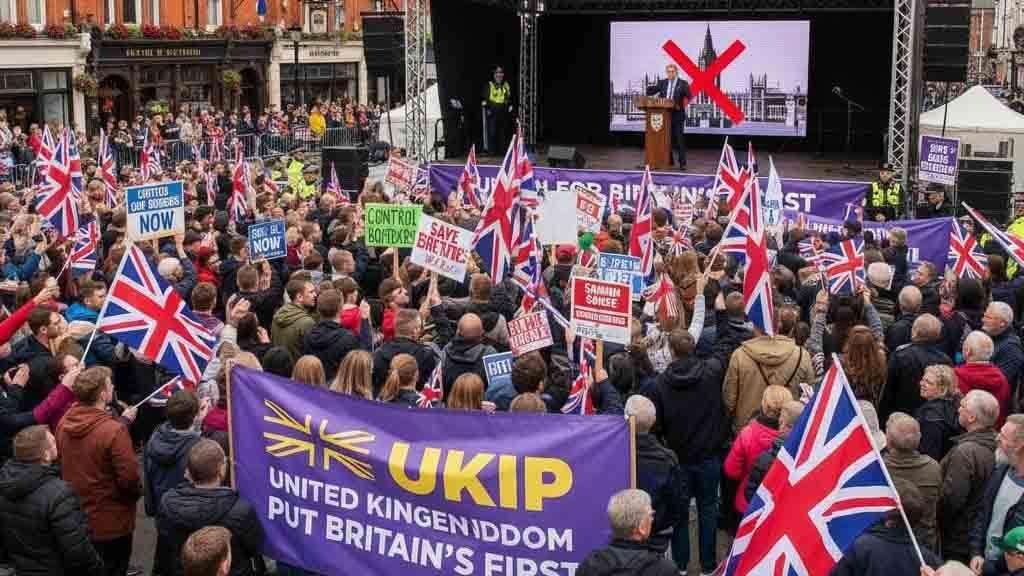The Metropolitan Police have banned a planned UKIP march led by controversial figure Nick Tenconi from entering the borough of Tower Hamlets this Saturday. The decision follows massive, unified opposition from anti-racist groups and the local community, which activists say made the prospect of disorder too high for the police to manage.
While the ban is celebrated as a victory for anti-fascists, the development has immediately become a political flashpoint in the borough ahead of the upcoming mayoral election. Local politicians from the Labour party and their rivals are intensely vying to take credit, despite the community's unified stance against the far right.
Tenconi, recently seen performing a Nazi salute at a protest, had intended to march through Whitechapel as part of a UKIP “mass deportations tour,” framing it as a "crusade" to "reclaim" the area from "Islamists." The borough has the largest percentage of Muslim residents in the UK, predominantly of British Bangladeshi origin, a community Tenconi sought directly to antagonise and intimidate.
Community Unity Overcomes Political Division
Crucially, in the face of political in-fighting, the British Bangladeshi community—which forms the largest single ethnic group in Tower Hamlets—has shown a strong, united front against the far-right provocation. Community leaders and local organisations have been instrumental in spearheading the counter-mobilisation, reminding the borough of its proud history of anti-fascist resistance, epitomised by the Battle of Cable Street in 1936.
This unity stands in contrast to the opportunistic squabbling observed in the political arena. A local political insider noted, "The moment the police blocked the march, everyone started positioning themselves. This is a crucial, emotive issue, and both sides—the sitting mayor and anti-Labour opposition figures—are clearly trying to use the community's victory as a political card to galvanise votes ahead of the local election."
Anti-Racists Caution Against Crediting the State
Tower Hamlets Stand Up To Racism (SUTR), a key group in the counter-mobilisation, cautioned against praising the police, arguing the ban was an act of self-preservation by the Met. A spokesperson for SUTR argued, “We shouldn’t give the police credit. They were so concerned about how big our mobilisation was going to be they didn’t feel they could facilitate the far-right march. If we hadn’t mobilised, the far right would have reached Whitechapel.”
Activists emphasised the danger of relying on state bans, which can demobilise anti-racist efforts and set a negative precedent, especially given the "institutional racism of the Met police exposed over the years."
Far-Right Pivots to Central London
Following the ban, Tenconi announced a redirection of the march to Central London. UKIP supporters now plan to meet near London Oratory and march to Hyde Park Corner. Tenconi posted on social media that the new plan aims to “liberate Britain from two-tier policing and Islamist terror.”
In response, SUTR is shifting its main counter-protest to Hyde Park Corner at 11:30 am this Saturday to confront the far-right leadership.
Simultaneously, anti-racist organisers are maintaining their presence in East London, urging local residents to attend a pre-planned unity march in Whitechapel at 12 noon. The goal is to "fill Whitechapel with anti-racists and show the far right what they would have faced," transforming the planned protest location into a massive display of local unity against racism and the far right, led by the steadfast British Bangladeshi community.
Crucially, this political jockeying occurs against the backdrop of the upcoming mayoral race. The incumbent, Mayor Lutfur Rahman, who belongs to the Aspire party, is the most formidable candidate in the next election. His primary challenge will come from the Labour Party, which has already selected its candidate: Councillor Sirajul Islam, the current Leader of the Opposition.








.svg)

_2.jpg)
